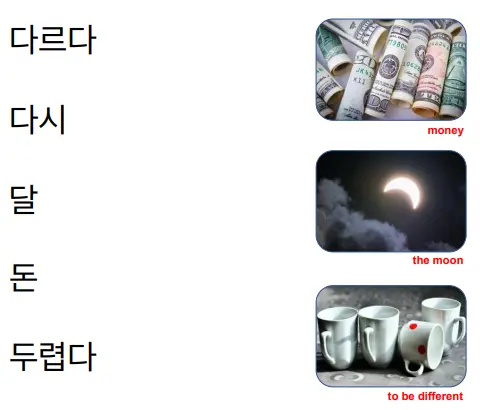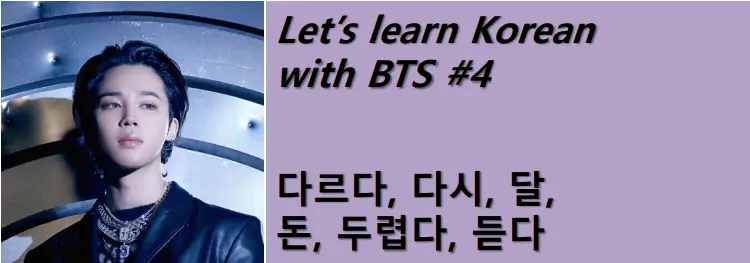Basic Korean words beginning with the consonant ㄷ([di-geut], [d] sound)
Let’s learn Korean words 다르다, 다시, 달, 돈, 두렵다, 듣다 with BTS lyrics.
Click on the image below to listen to all the BTS lyrics used in this post.
다르다 [da-reu-da] to be different, to be changed

ⒷⓉⓈ 여전히 그때와 다른 게 별로 없는 걸
yeo-jeo-ni geu-ttae-wa da-reun ge byeol-lo eop-neun geol
Nothing much has changed from back then
*여전히(still) +
그때(back then) + 와(with) +
다른(다르다(to be different) + ㄴ(noun modifier)) + 게(것(thing) + 이(subject topic)) +
별로(not much) +
없는(없다(there isn’t) + 는(noun modifier)) + 걸(것(thing) + 을(object topic))
(*것 is the most common dependent noun in Korean and means thing.
거 is a shortened form of 것 and 게 is a shortened form of 것이(것+이(subject marker)).
건 is a shortened form of 것은(것+은(topic marker)) and 걸 is a shortened form of 것을(것+을(object marker)).)
다시 [da-si] again

ⒷⓉⓈ 이 순간은 언제든 다시 찾아오지 않아
i sun-ga-neun eon-je-deun da-si cha-ja-o-ji a-na
This moment won’t ever come again
*이(this) +
순간(moment) + 은(topic particle) +
언제든(whenever) +
다시(again) +
찾아오지 않아(찾아오다(come back) + ~지 않아 (don’t))
(*이 means ‘this (near you)’, 그 means ‘the / that (near the other person)’ and 저 means ‘that (over there)’.
‘이, 그, 저’ are always followed by a noun and are used to refer to things or people.
To use 이, 그, and 저 as pronouns, 거/것 (thing) needs to be added after these words.)
달 [dal] the moon

ⒷⓉⓈ 참 예쁜 별과 예쁜 달
cham ye-ppeun byeol-gwa ye-ppeun dal
The pretty stars and pretty moon
*참(very) +
예쁜(beautiful) + 별(star) + 과(and) +
예쁜(beautiful) + 달(moon)
달 [dal] month

ⒷⓉⓈ 올해 이제 네 달 밖에 안 남은 거네
o-lae i-je ne dal ba-kke an na-meun geo-ne
There are only four months left this year
*올(this) + 해(year) +
이제(now) +
네(four) + 달(month) + 밖에(only) +
안(not) +
남은 거네(남다(remain) + 은 것 + 이다(to be))
(*‘은/는 것’ is used after a verb stem. It changes a verb into a noun and it can be used in front of ‘이다’.)
돈 [don] money

ⒷⓉⓈ 그래 돈 벌자
geu-rae don beol-ja
Yeah, let’s earn money
*그래(okay/alright) +
돈(money) +
벌자(벌다(earn) + ~자(let’s))
두렵다 [du-ryeop-tta] to be afraid

ⒷⓉⓈ 뭐가 두려워?
mwo-ga du-ryeo-wo
What are you afraid of?
*뭐(what) + 가(subject particle) +
두려워(be afraid (of))
(*뭐 is the shortened form of 무엇. 무엇 is a noun and 뭐 is an adverb or a noun.
무슨 also means ‘what’, but it’s an adjective, so you can use it if you have a noun after it.)
듣다 [deut-tta] to hear, to listen

ⒷⓉⓈ 자 놀라지 말고 들어
ja nol-la-ji mal-go deu-reo
Don’t be surprised and listen
*자(hey) +
놀라지 말고(놀라다(be surprised) + ~지 말고 (don’t ~ and)) +
들어(듣다(listen) + 어(an imperative ending suffix))
(*You can use 자 at the beginning of a sentence to indicate that you want to start talking about something else.)
Grammar Reference
*Noun + ~이/가 : noun + subject particle
ex) 뭐가 : 뭐(what) + 가(subject particle)
이 for nouns ending in a consonant, 가 for nouns ending in a vowel.
*Noun + ~은/는 : noun + topic particle
ex)순간은 : 순간(moment) + 은(topic particle)
은 for nouns ending in a consonant, 는 for nouns ending in a vowel.
*Noun + ~와/과 : with, and
ex)그때와 : 그때(back then) + 와(with)
별과 : 별(star) + 과(and)
과 for nouns ending in a consonant, 와 for nouns ending in a vowel.
*Verb stem + ~지 말고 : don’t ~and(informal negative commands)
ex)놀라지 말고 : 놀라다(be surprised) + ~지 말고(don’t ~ and)
*Verb stem + ~자 : let’s, shall we
ex)벌자 : 벌다(earn) + ~자(let’s)
Verb + ㅂ/읍시다 : more formal expression than ~자
*Adjective[verb] stem + ㄴ/은/는/을 + noun : noun that adjective[verb]
ex)다른 게 : 다르다(to be different) + ㄴ(functions as a noun modifier) + 게(것(thing) + 이(subject topic))
ㄴ/은/는/을 is added to verbs and adjectives to allow them to function as noun modifiers
*Verb stem + 아/어/여라(an imperative ending suffix)
ex)들어 : 듣다(listen) + 어(an imperative ending suffix)
Imperative form is used when you want to make a request or command.
아/어/여라 is an imperative ending suffix.
*Easy Korean Numbers: Counting in Korean from 1 – 100+
ex)네 달 : 네(four) + 달(month)
You can learn numbers in Korean on the website below.
Easy Korean Numbers: Counting in Korean from 1 – 100+
Quiz. Linking words to images

BTS music video to enjoy
Well done for making it this far.
Watch the Yet To Come (The Most Beautiful Moment) music video above and see if you can hear “여전히 그때와 다른 게 별로 없는 걸”, which you learned today.



